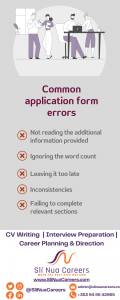Q: I’m about to apply for a job in the public service and the process includes a lengthy application form. I’ve looked at it a few times and I’m almost afraid to start – are there common pitfalls to avoid as I set about this task? I’ve never completed one of these forms before, but I have heard friends give out yards about them. I’d really love to get this job as it would allow me to relocate back to my home area. (FD, email).
A: Application forms seem to be growing in popularity, particularly in the public service. Yes, they can be challenging affairs. Many people start them only to find that they need help halfway through, particularly with those forms that require you to write at length about your experience and competencies.
 Here are five common errors people make when completing application forms:
Here are five common errors people make when completing application forms:
- Not reading the supplementary information generally provided with the form. While the form may appear to be convoluted at first glance, the supplementary information often explains why certain questions are there. For example, while it might appear that you are being asked to enter your education details twice, the second education section may relate only to your relevant qualifications for the role. If you rush through the form, you may miss this nuance, and repeat your full education details again – causing you to feel that the form has unnecessary repetition and, more worryingly, resulting in you not hitting the spot exactly as requested.
- Failing to observe the word count guides in the various sections. A particular area will specify “no more than 250 words” words, for example. I never cease to be surprised by the number of people who blithely sail well beyond those limits. I haven’t yet heard of somebody being disqualified from an application process because of exceeding the word limit – but it goes without saying that you should observe their criteria. Plus, why do you need so many words? Can you be more succinct?
- Leaving it too late to start the task of completing the application form. If you have one looming on the horizon, trust that it will take much longer to complete than you think. That’s just the nature of the beast. If you leave it too late, you may miss the deadline entirely; and you will almost certainly fail to sell yourself properly, even if you do hit the deadline.
- Creating confusion through inconsistencies – in this case, I’m particularly referring to things like dates you started and finished jobs, and whether they accord with what’s on your CV or LinkedIn profile. Confusion creates doubt, and doubt is not what you want as you start out on the process of securing a position.
- Simply failing to complete relevant sections. People frequently lose the will to – well, not quite live – stay the distance when completing forms. If you find yourself getting googly eyed as you go down the stretch, perhaps it’s time to enlist the help of a family member, colleague or friend. A fresh pair of eyes could be just the boost you need as you bring the form to conclusion. They are unlikely to thank you for dragging them into it, but, in a tight corner, needs must.
Featured image courtesy of Pixabay.
Need advice on filling in an application form? Go HERE for details of our application form service
Need our help? Complete this form below and we will get back to you






